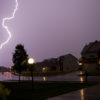There are many situations that warrant shocking your swimming pool, and it should be part of your weekly pool maintenance during times that your pool is used regularly. Shocking is a process of super-chlorinating your swimming pool water to kill germs, bacteria, and algae that could be growing. Shocking keeps the water cleaner and safer for those that swim in it. Know that you always have the option of working with a professional pool service that offers chemical treatment, like shocking, to their clientele. In Arizona, Florida, or Texas, call on the team at Pool Troopers for assistance with shocking your swimming pool.
Here are a few things that pool owners need to know when it comes to pool shocking:
Shock your Pool
Shocking a swimming pool refers to adding high levels of chlorine to the water to kill germs and contaminants. This high-level of chlorine shocks the water, hence killing pollutants that could make you sick. You know the strong bleach smell of a chlorinated pool? That smell occurs when the chlorine interacts with nitrogen found in body sweat, urine, and oils, and these contaminants are in your pool’s water. Clean chlorinated pools have little to no smell. Chlorine kills bacteria, so make sure that you incorporate this process in your regular pool maintenance regimen and stay safe. If the pool has a strong chlorine smell, it is time to shock the water!
Time to Shock
Other than the strong smell previously mentioned, there are some telltale signs that it is time to super-chlorinate or shock your pool water. One such indicator is the appearance of algae. Algae is green and slick, creating a serious safety risk due to how slippery it makes surfaces, which could be a fall hazard. Another sign that it is time to shock is when the free chlorine level of your pool’s water is zero when measured. Do yourself a favor and stay on top of testing and checking chemical levels of your pool often.
Some owners may think that they can wait for the water to be dirty before chlorinating, such as when it appears cloudy or smells. Don’t wait; it is suggested that pool owners shock their swimming pools at least once a week, depending on how heavy you use your pool. Some other situations and instances that merit additional shocking include these:
- Heavier use of the pool than usual, like a party or get-together
- Heavy rains
- Spills in the pool
- Excess debris of foliage in the water, such as after a storm
- Someone urinates, vomits, or defecates in the pool water
- When pollen is present on the surface of the pool water
- Significant change in water levels, due to weather or other environmental factors
Many of these scenarios also mandate that you drain the pool and start from scratch. A full-service pool company can be a lifeline during these times- or when you want a clean pool without all the work!
Get Your Supplies
So, what will you use to shock your swimming pool? Are all chlorine products the same? Check out the various products available to you on the market as well as which ones are recommended by your own pool manufacturer online. They may have specific products that work best for their buyers. Also, you can get pool shock treatment from your pool service retailer, home and garden store, or pool professional. Pool shock products help fight against contaminants and algae, plus it keeps your pool sanitary during this pandemic. Shocking keeps the water fresh and crystal clear so stock up on what you need for the season. It is imperative to always read the label and use the shock product as recommended. Also, keep these and all pool chemicals out of reach of children and pets. These types of supplies should be kept in a sheltered place that is cool and dry, such as a shelf in a climate-controlled garage or storage building.
Shock Saltwater, Too
Interestingly enough, saltwater pools do not transmit the germs that cause Coronavirus- but you should shock these pools just the same. There are some common granular shocking products favored by saltwater pool owners and distributors; talk to your pool professional to learn more.
What to Do
So, the real question is: how do you shock a pool? It sounds much more difficult and laborious than it is but know that you can hire a pool chemical service professional to take care of it for you at any time. In fact, the benefits of hiring a pool pro can include fewer repairs, cost savings, and a longer life for your pool.
When shocking your pool, the aim is to get the chlorine level around ten-times higher than usual. It is recommended that you only attempt to shock the pool at early evening or dusk since the sun can interfere with chlorine in the water. When you do it at night, the chemicals are undisturbed by the sun’s rays and it is likely easier to keep swimmers out after dark.
Steps on How to Shock a Pool:
- First, test the water in the pool. What is the pH level? If you need a water testing kit, make sure to reach out to your pool supplies retailer right away; these are integral tools for maintaining your pool.
- Consider the formula that indicates the right amount of chlorine to add to the pool. To figure this out, you must know the size of your pool and follow shock product manufacturer recommendations for use. Since every chemical shock product is different, make sure to read the label thoroughly.
- Turn on your pool pump. The pump should be running during this process, and for a period of around six hours or longer after adding the chlorine to the water.
- When adding the chlorine shock to the pool water, try to aim for around the perimeter of the pool and in the corners.
- After the allotted time has passed as recommended on the label, test the water again to make sure the chlorine levels are adequate and safe for swimming.
Remember that you should not use the swimming pool immediately after treating and chlorinating. Check and watch for the free chlorine levels to be at safe levels, around 1-3 ppm is recommended. Keep others out of the pool until the levels are safe for swimming.
Want some help shocking your swimming pool? Contact us! Pool Troopers Professional Pool Service provides chemical, cleaning, and repair pool services, including shocking the water to get rid of germs, bacteria, and contaminants.



